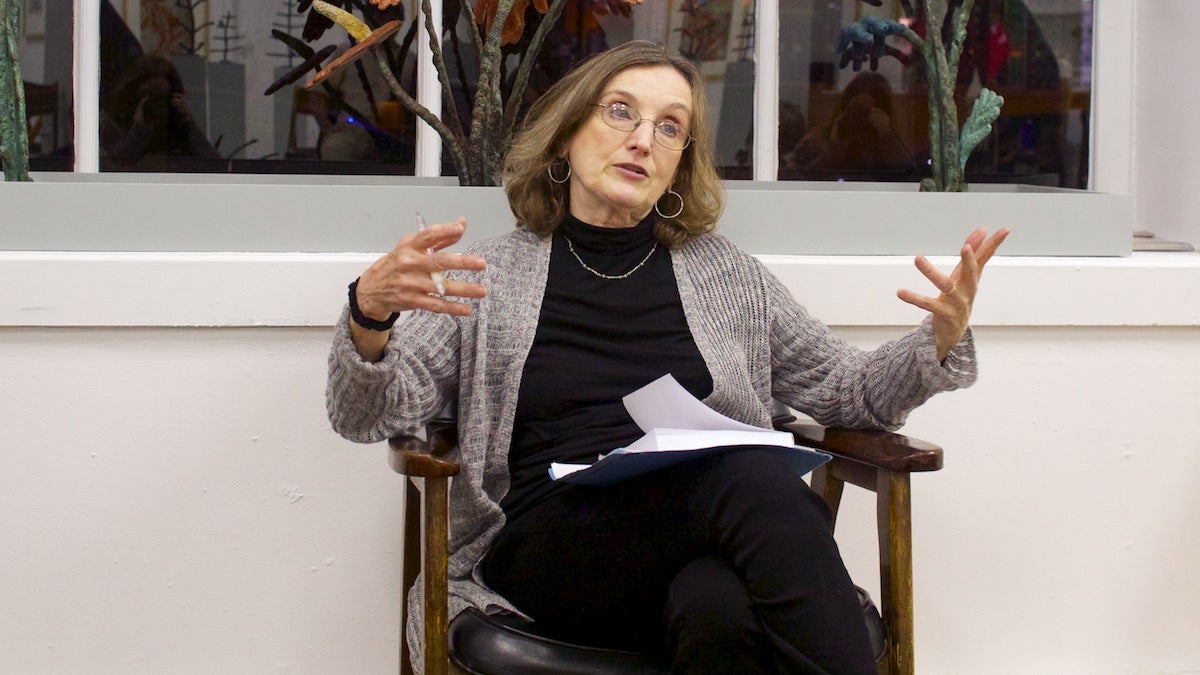Race a key issue for organized women’s movement in Northwest Philadelphia

Author Karen Bojar discusses the organized feminist movement in Philadelphia at a reading in Germantown's iMPeRFeCT Gallery. (Jana Shea/for NewsWorks)
The Philadelphia chapter of the National Organization for Women made some serious gains for gender equality during the movement’s heyday. Despite its successes, however, there were shortcomings when it came to ethnic and economic diversity.
That weakness was the impetus behind the formation of the Germantown chapter of NOW, explained Karen Bojar, author of “Feminism in Philadelphia: The Glory Years, 1968-1982,” during a book reading last week at Germantown’s iMPerFEct Gallery.
“They felt that they had to focus laser-like on gender,” Bojar said, explaining that the belief was that not as much would have been accomplished for women’s equality if attention was directed towards any other issue.
Philadelphia NOW was in the vanguard when it came to lesbian rights, but its deficiency in championing racial equality disenfranchised many women. Finding a way to celebrate the chapter’s achievements while acknowledging the limitations presented a challenge to Bojar when writing her book, she said.
Organized feminism in Philadelphia
NOW’s Philadelphia chapter has roots in the city’s Northwest. It was co-founded in 1968 by Ernesta Drinker Ballard, a Chestnut Hill resident from a prominent family, best known for her horticultural work through the Pennsylvania Horticultural Society and the Philadelphia Flower Show.
Members achieved an “astonishing number of victories in a very short period of time,” Bojar said. These included the desegregation of classified advertisements for employment, the lauch of the first all-female produced and directed television show on WPVI, the formation of a women’s political caucus. The group also moved to open doors for the advancement of women in Philadelphia’s police force.
For former Germantown NOW member Barbara Mitchell it was the organization’s work towards ending sexual discrimination within the Philadelphia School District that she is most proud of. NOW activists successfully helped to desegregate Central High School.
Mitchell and former Germantown NOW leader Betsy Parziale — both educators — also obtained federal grant money to host workshops on inclusion in the city’s elementary schools.
Membership exploded in the 1970s, the result of growing awareness of the fight for gender equality. Still, NOW’s ranks consisted primary of white women from middle class backgrounds, Bojar said.
Pro-choice rights, lesbian rights, improving the image of women in the media and ending sterilization abuse were part of the defined list of priorities by Philadelphia NOW.
Raising the status of women of color, immigrants and those of the working class took a backseat, she noted. The author said Ballard and others often gave the excuse of not knowing how to reach out to women of differing backgrounds in a city which, back then, was highly segregated.
Philadelphia NOW further alienated black women by attacking civil rights icon Cecil B. Moore when it presented its annual “Barefoot and Pregnant” award for egregious sexism to Moore because of his cross examination of rape victims, she said.
A splinter group
Frustrated by the city chapter’s lack of inclusion, Joycelyn Morris founded the Germantown chapter of NOW in 1980 to educate women of color on how the Equal Rights Amendment could benefit all womankind.
The group was a natural draw for Mitchell. Through her experiences in the Peace Corps, subsequent world travels and as an educator at the racially integrated Cook Junior High School, Mitchell had gained a broadened perspective not common to many white women of her generation.
“I was living it every single day,” Mitchell said.
The splinter chapter only lasted a few short years. Morris left discouraged, because she felt she was doing the majority of work in the chapter (she moved on to become co-chair of NOW’s Combating Racism Committee). Parziale assumed the leadership position next, but she too left exhausted. With no one else willing or able to take over, Germantown NOW dissolved, Bojar said.
By then, the Pennsylvania state chapter of NOW had become a leader in addressing the connection between racial and sexual discrimination, attracting Philadelphia women who wanted to be more involved in solving both problems.
The future of NOW
After the election of Ronald Reagan, the rise of the conservatism caused the movement’s aims to shift more towards protecting gains rather than pushing for more. NOW began to suffer from conflict and division caused by attempted take-overs by the Socialist Workers Party as well as tensions concerning race, Bojar said.
There was also considerable volunteer burn-out from the epic struggle for federal ERA passage, which ended in defeat in 1982. “That was really taking a toll on everybody,” Mitchell said.
Gone is the exciting “new day dawning” feeling of those heady early years, Bojar said. It’s unclear how much longer NOW will survive. “We desperately need new blood,” she added.
Bojar acknowledges that each generation develops its own model for championing its social causes and younger activists seem more inclined to embrace those with a more horizontal structure, like the Occupy movement. She asserts that if NOW is to continue, its future lies in the close collaboration with labor unions. Philadelphia NOW, for example, shares strong ties with the Coalition of Labor Union Women.
The challenge now, Bojar said, is to improve the lives of those women who have yet to benefit from the progress made by NOW and the numerous other participants in the second feminist movement.
Although new ERA legislation has been introduced in the 2013-2014 session of Congress, it is income equity and betterment of conditions for working women that are critical. Raising the minimum wage, providing earned sick leave and affordable child care will help working women, particularly single mothers, Mitchell added.
“We still need this,” Bojar said.
WHYY is your source for fact-based, in-depth journalism and information. As a nonprofit organization, we rely on financial support from readers like you. Please give today.




